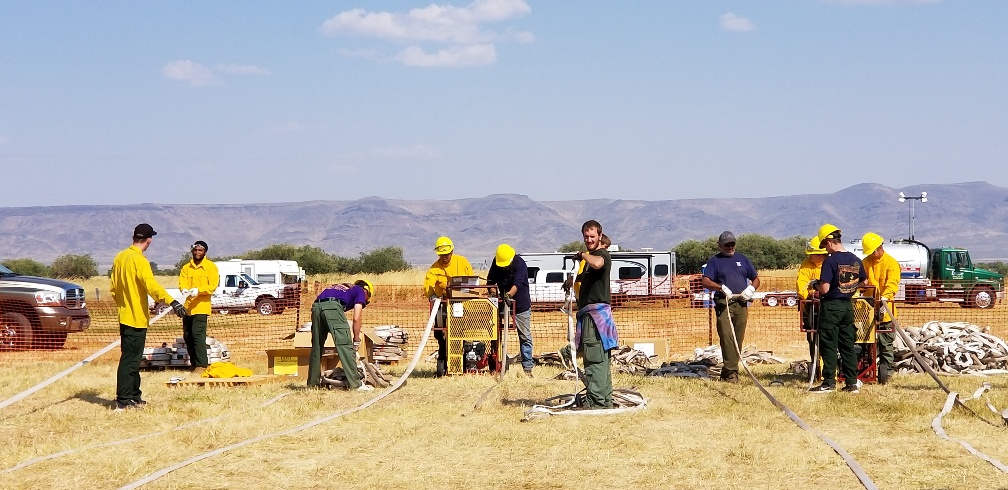
By QUINTON SMITH/YachatsNews.com
Mikell Sumerau fought with the U.S. Army in Kuwait and Iraq and during his time with the Army National Guard was deployed to every state on the West Coast.
But the biggest fight for Sumerau and his wife, Andrea, may be over the future of their jobs and the dormitories, classrooms, shops and offices that make up the Angell Civilian Conservation Center three miles north of Yachats.
On the Friday before the long Memorial Day weekend, the U.S. Forest Service announced that on Sept. 30 it would end its 55-year oversight of 25 Job Corps Centers stretching from Oregon to Virginia. It will turn management of the centers over to the U.S. Department of Labor, which already contracts with private operators to run 98 Job Corps centers.
Labor officials announced simultaneously they would close nine Forest Service centers, including one in the Mount Hood National Forest southeast of Portland, and find contractors to run the other 16 – including Angell.
Pushed by a the Trump Administration’s $700 million cut to the Job Corps’ $1.7 billion 2019-21 budget, the Forest Service said the change would allow the agency to focus on its primary mission of managing forests, not training disadvantaged young people for work.

The Labor Department, in turn, said the change “creates an opportunity to serve a greater number of students at higher performing centers at lower cost to taxpayers by modernizing and reforming part of the Job Corps program.”
Baloney, contends Sumerau, who represents 45 Forest Service union employees at Angell – some of the 1,110 members of the National Federation of Federal Employees at the Forest Service centers expected to lose their jobs. He’s being joined in that sentiment by a growing number of local communities, students, former students, and Congress members opposing the closures and privatization.
“The Department of Labor has been going after the Forest Service centers for years,” Sumerau says. “They don’t like the Forest Service standards for running these places. It’s always been a pissing match between the two of them.”
That changed two years ago when President Donald Trump appointed Sonny Perdue, a former governor of Georgia, as head of the U.S. Department of Agriculture, which oversees the Forest Service. He also named Alexander Acosta, a former U.S. attorney in Florida, to head the Department of Labor.
But their announcements were foreshadowed 10 months earlier in a major New York Times story that drew upon Inspector General reports critical of the Job Corps, especially — but not all — contractor-run centers.
“Its budget, protected by lawmakers in both parties, is safe for now,” the Times wrote. “Yet almost everybody involved in the program — including students and the labor secretary — questions whether the target population of inner-city and rural youths is well served by a 50-year-old work force model based on housing students in fenced-in former military bases and shuttered hospitals, often miles from the jobs they need.”
The Forest Service, Job Corps and Angell
The Forest Service’s Job Corps centers were born in 1964 as part of President Lyndon Johnson’s war on poverty. The agency drew heavily on its Depression-era Civilian Conservation Corps to set up centers in rural areas to take disadvantaged boys – now the centers are co-educational – keep them out of trouble, educate them, and train them in conservation work or trades.
The Angell Job Corps campus got its start as part of the CCC in 1941. It closed at the start of World War II but soon reopened to house conscientious objectors working on nearby forest conservation projects. It closed again at the end of the war, then became Forest Service offices until the Angell Job Corps Center was established in 1965.

Now it is a sprawling, 17-acre mix of classrooms and shops, dormitories and cafeteria, offices, a large gymnasium, sports fields, two staff houses and everything else to operate a self-contained community of more than 200 students and employees on a yearly budget of $5 million.
The free program is open to men and women age 16-24 who meet low-income requirements, need help to finish schooling, are homeless, in foster care, or lack family support. Applicants go through a regional screening process and then are assigned – voluntarily, they can leave the program at any time – to a center.
Angell currently has 115 students, substantially more than a year ago but short of its capacity of 160. In addition to the 45 federal employees, there are 20 contract workers, ranging from medical staff and counselors to instructors and dorm monitors.
It offers students the chance to earn a GED or high school diploma, and trade certifications in forestry, carpentry, plumbing, painting, masonry and automotive repair. Students work at their own rate, generally taking 12 to 18 months but as quickly as six months or up to two years to finish their education or training.

As of April, Angell ranked 80th of 117 Job Corps Centers based on educational success, training completion and job placement, according to Forest Service reports. But it was fifth overall in full-time job placement.
For several years, until last winter, Angell struggled with management issues that resulted in resignation of the center’s director and appointment of temporary directors. It also was rocked by the July 2018 arrest of dormitory manager Brady Endicott of Waldport on federal embezzlement charges for stealing tools. In April a Lincoln County jury convicted Endicott on 13 felonies, ranging from kidnapping to weapons violations involving his wife and mother and threats to initiate a mass shooting.
Bryan Wilson was hired as center director late last year to turn the center around, hire new staff, recruit and retain more students and re-connect its programs with the community. It’s working, Sumerau and other staff say.
“Now we have good staff and we’re on the upswing with enrollment and job placement,” Sumerau said. “And now we have this catastrophe.”
How it’s supposed to work
As big a surprise as the May 24 closure and privatization announcements were, what’s even more mystifying to everyone from Yachats to Washington, D.C. is how the procedure — if there is one — might work.
Job Corps placement offices have already stopped sending new students to most Forest Service centers, instead directing them to contract centers.
Six days after the announcements, the Labor Department filed its notice in the Federal Register outlining its criteria for determining closures and giving the public until July 1 to comment.
While Forest Service employees are eligible to transfer to other agency positions or elsewhere in the federal government, an email to Job Corps employees said the agency will also start “reduction in force” procedures to lay off workers. That process should be finished by the end of the year, the email said.
“It’s too early to know how this will work,” said one official in Washington, D.C. affiliated with the Job Corps but who requested anonymity because of their sensitive position. “This hasn’t been done before. We just don’t know what the process is going to look like.”

But closures are not particularly new. Last year, the Forest Service shut three centers and the Labor Department closed one.
In emails to the media and letters to employees, both agencies pointed to the December 2018 closure of the Forest Service’s Centennial center in Nampa, Idaho as the model they will follow.
Centennial was the Job Corps’ second-highest rated performer in 2018. It had 242 students and 45 employees. The Job Corps said the state of Idaho and a local two-year college will eventually operate the facility.
Centennial students transitioned out of the center between January and April. But Forest Service employees remain – doing nothing.
“They just shut us down,” said one Centennial employee contacted by telephone. “There is no plan. We’re sitting here waiting for our reduction in force letters.”
A Job Corps official who asked for anonymity to protect their job, said if the federal government couldn’t close one center like Centennial in six months, how will it close nine, find contractors for the other 16 and find new programs for thousands of students by the end of September?
“If Centennial is their pilot program for closures I can’t see how they save the taxpayers any money,” the official said. “There’s no plan that we can see at all how this will work out.”

Forest Service centers versus contract centers
There are five Job Corps centers in Oregon. In addition to Angell, the other two Forest Service centers are Wolf Creek near Glide and Timberlake near Estacada. Timberlake is slated to close.
The Labor Department oversees two contract-run centers — the Tongue Point center near Astoria and Springdale center near Troutdale.
Forest Service Job Corps officials defend their program by pointing out that 17 of the top-ranked 25 centers are run by the agency.
There are other notable differences:
- Forest Service centers are closed campuses. Whenever individuals or groups are off campus they must have a staff member with them. Contract centers allow students to have vehicles and come and go as they please.
- Forest Service centers are generally smaller with 100 to 250 students; some contract centers have as many as 500 students.
- Contract centers have little to no community outreach projects. Forest Service centers perform service projects in neighboring communities and are able to send students and fire crews to work on federal property. In 2018, Angell students performed almost 3,000 hours of community service, everything from clearing trees along the Amanda Trail in Yachats to helping at fishing derbies in Waldport to building sidewalks along the Toledo harbor.
- Forest Service centers maintain a link to the agency by offering certificates in urban forestry, wildland firefighting and fire camp management. Contract centers do not. In 2018, Angell students totaled 600 hours on Forest Service projects and were sent to eight fires, working almost 19,000 hours.
- Sumerau said his job as a Forest Service Job Corps standards officer pays $29.32 an hour. The same job at a contract center, he said, pays $18 an hour.
Sherry Hummel oversees orientation for new students at Angell. It formally lasts two weeks, but she often spends 6-8 weeks helping students adjust to their new, more regimented life.
Some have a direction, she says. Others are homeless, leaving the foster care system and have little, if any, family support. Some have varying degrees of autism or attention deficit disorders, others are veterans seeking training.
“I don’t now if the contract centers can offer the human element that the Civilian Conservation Centers provide,” Hummel says. “For us, it’s not just a paycheck.
“Without the Job Corps there’s no program for them out there. Many will be on the street.”

The next few months
For the immediate future everyone connected to Angell Job Corps center is grasping for information.
An email making the rounds this week hailed a news story – without Labor Department confirmation — from Montana that said a Republican senator there had secured a personal commitment from Trump to keep open one Forest Service center in that state slated for closure.

The federal employees union is offering regular updates on reaction in Washington, D.C., including legislation introduced in the House and Senate on Tuesday that would prevent spending money to implement the proposed changes. That legislation passed out of committee Wednesday and is will be up for a full House vote.
Until Wednesday, Oregon’s congressional delegation had been quiet on the issue. Two of the affected Job Corps centers (Angell and Timberlake) are in Rep. Kurt Schrader’s district. His office and communications director did not respond to four emails and/or calls from YachatsNews.com seeking comment. On Wednesday, Sen. Jeff Merkley issued a news release about a letter signed by 18 senators and 33 House members — including Schrader, Sen. Ron Wyden, and Oregon Reps. Peter DeFazio and Suzanne Bonamici — asking Perdue and Acosta a series of questions, to explain their decision in more detail, and object to the closures and conversions without consulting Congress.
The Trump Administration routinely ignores such requests, especially in the Republican-controlled Senate.
There was a gathering and information session for Angell students Tuesday evening. Job Corps officials are still uncertain how – or if – students will be transferred from Forest Service centers to contract centers.
“The students are fearful too,” said Sumerau. “They’re asking ‘Are we going to be able to finish our training? Are we going to be homeless again?’
“A lot of our students look at us as Mom and Dad,” he said. “We’re the stability they’ve never had.”
Staff has the same concerns. They worry jobs paying $30,000 to $60,000 a year will disappear from a rural, coastal county where it’s a struggle to find jobs that offer wages and benefits to support a family. Is there an equivalent Forest Service job open somewhere? What about rent or mortgages or kids in college?
“It’s definitely going to affect the community,” one Job Corps official said. “There’s a lot of payroll out there; a lot of money being spent in rural communities. It will be hard on Job Corps students and hard on staff and their families.”
How this story was reported:
Following the May 24 closure announcement, the Forest Service’s Job Corps headquarters in Denver, the U.S. Department of Agriculture and the Department of Labor in Washington, D.C. issued only general news releases about the issue or process. After a few days, the USDA’s information offices began referring all media inquiries to the Department of Labor. Information officers would not return phone calls and the offices only responded by unsigned emails which did not address detailed questions.
Managers working for, affiliated with or deeply knowledgeable with the Job Corps were prohibited or reluctant to talk to the media. But a handful did talk to YachatsNews.com — after work and on private phones and only on background or if they could remain anonymous. Union members, who have greater protections on speaking to reporters, talked on the record during non-work hours.
Job Corps students are free to talk — and YachatsNews.com will be telling their stories this month.
— Quinton Smith/editor, YachatsNews.com
A USDA/DOL statement from June 4:
“As part of the normal 30-day comment period for DOL’s Federal Register Notice, we have heard from Members of Congress, retirees, and other stakeholders about concerns with closing USFS Job Corps centers. We’ve asked the USFS to evaluate those concerns while reviewing its role in Job Corps management and operation. DOL and USDA are committed to maximizing opportunity and results for students, minimizing disruptions, and improving overall performance and integrity. DOL and USDA will conduct a robust organizational review to determine the appropriate course of action keeping in mind the USFS mission, the students we serve, and the American taxpayers. As USDA looks to the future, it is imperative the USFS focuses on and prioritizes its core natural resource mission to improve the condition and resilience of our Nation’s forests,” USDA/DOL Spokespeople
And another from the U.S. Department of Agriculture’s press office in Washington, D.C.:
As USDA looks to the future, it is imperative that the Forest Service focus on and prioritize our core natural resource mission to improve the condition and resilience of our Nation’s forests, and step away from activities and programs that are not essential to that core mission. The Department of Labor already operates the majority of Job Corps centers and are better aligned to run the entire program. The decision to return the operation and management of the Forest Service job corps sites to the Department of Labor is about allowing each agency to focus on what it does best. Labor will focus on jobs. The Forest Service will focus on forests.
With that in mind, we have to look at our core mission and ask ourselves “Are there things we are doing that could be done better by someone else?” And the answer to that is yes. It’s hard to change something that has been done one way for 50 years. Change is not easy. But, this transfer will allow USDA Forest Service to maintain mastery of our most critical task – the safety and health of our forests, while allowing DOL to continue the critical work of job training. Our decision to remove USDA/FS’s guiding hand from job corps is not new, it was in the President’s budget proposal for the last two years. And, this is not the first time there have been adjustments to job corps to make programmatic improvements. For example, the most recent planned transfer of Idaho’s Centennial job corps center to the State of Idaho. The State and its partners have great plans for the success of that site for its students. The Department of Labor’s proposal to deactivate 9 sites is separate from USDA’s decision. They conducted a methodical review to determine how best to serve the students. And, their proposed improvements are open for public comments so that everyone can provide feedback. We at USDA will work with DOL to make sure the transition is as smooth as possible for everyone involved.
Links to other stories of interest:
August 2018 New York Times story details troubles at contract centers and foreshadows recently announced changes: https://www.nytimes.com/2018/08/26/us/politics/job-corps-training-program
July 2017 Washington Post story outlines safety issues at Job Corps centers: https://www.washingtonpost.com/news/powerpost/wp/2017/07/17/job-corps-program-hit-on-student-safety-problems-despite-successes



